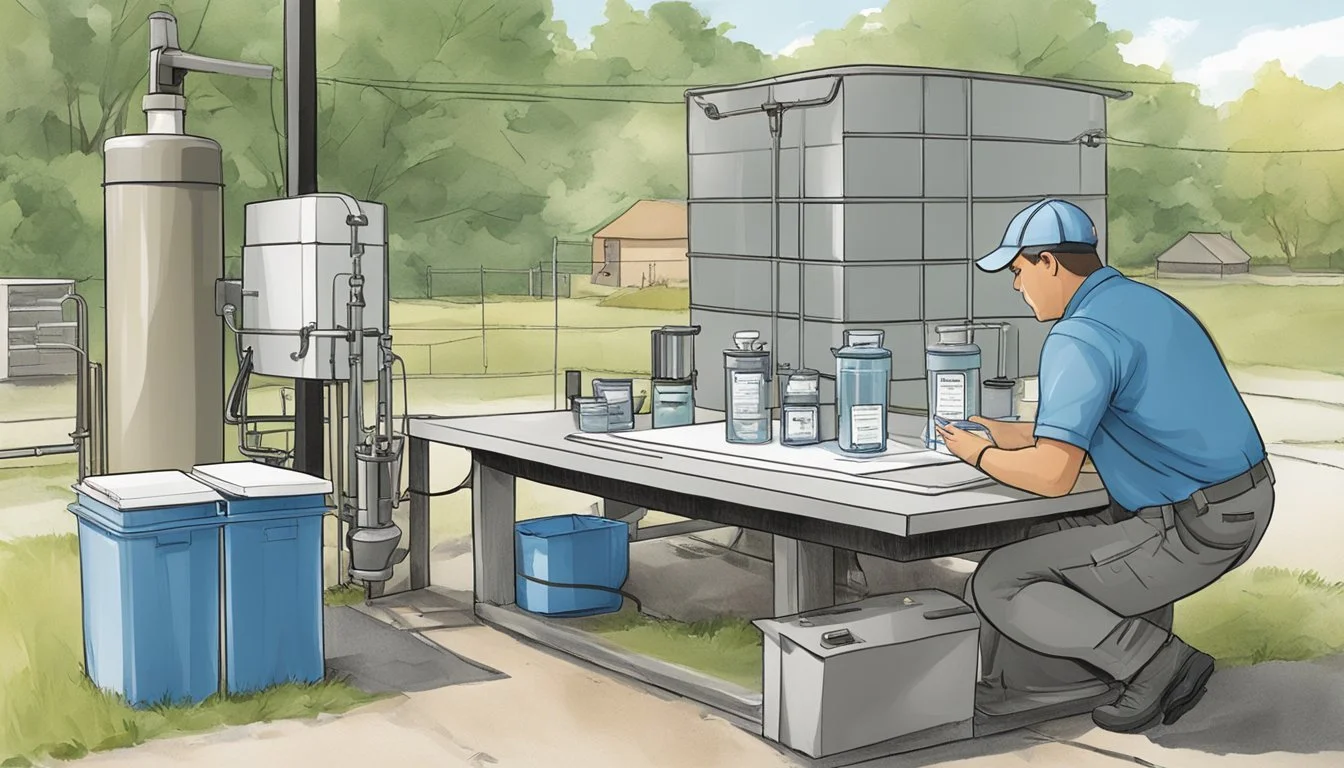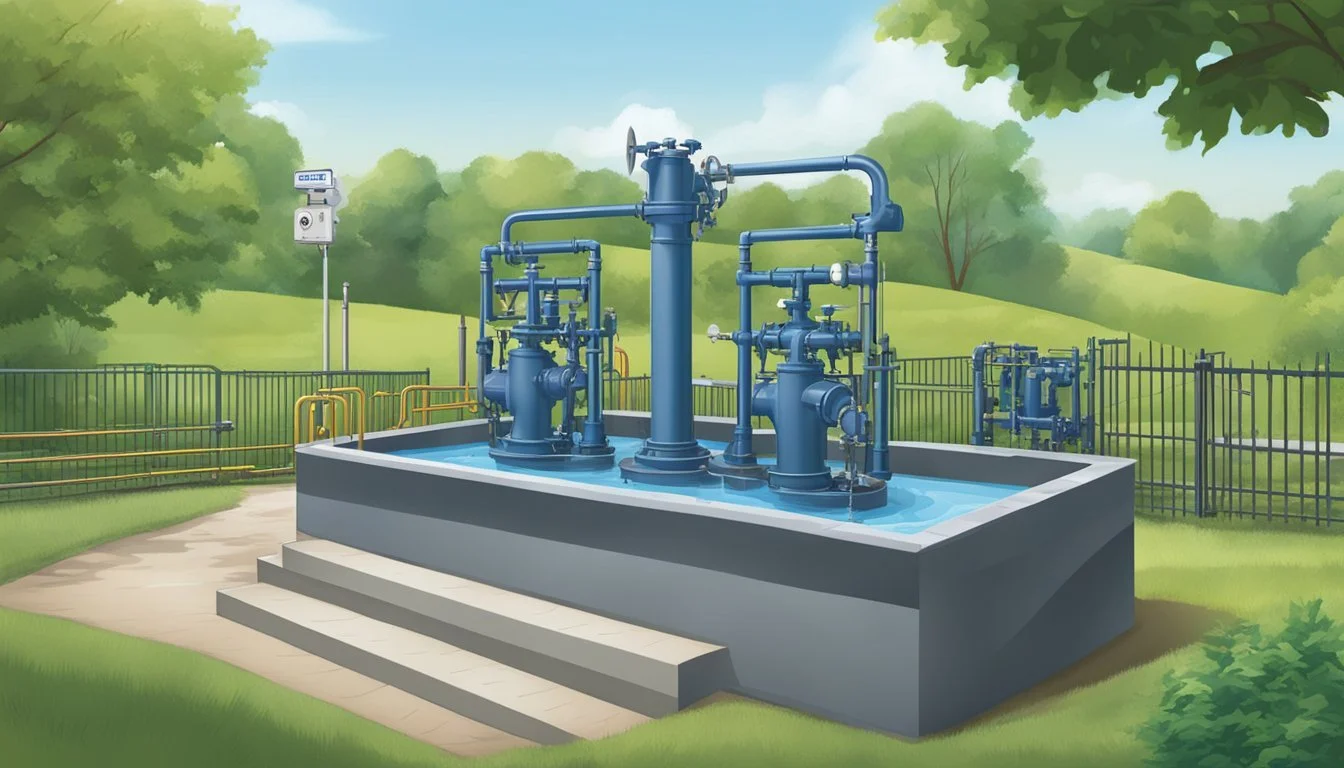New Jersey Water Well Regulations
Understanding Compliance for Property Owners
New Jersey has established a comprehensive set of regulations to govern the construction, maintenance, and abandonment of private wells, which play a crucial role in protecting public health. As a substantial number of residents rely on private wells for their drinking water, adherence to these standards ensures that the water from these sources meets safety requirements. The state's approach to maintaining safe drinking water is multifaceted, involving the assessment and monitoring of water quality, as well as prescribing actionable guidelines for the upkeep and discontinuation of well usage.
The New Jersey Department of Environmental Protection (NJDEP) is the key authority overseeing water quality and supply, including the certification of laboratories conducting environmental measurements. Under the New Jersey Safe Drinking Water Act, specific NJDEP rules effective from June 1, 2020, establish criteria that both private and public wells must meet. The act outlines the parameters for water testing, the qualifications necessary for testing laboratories, and the procedures for reporting results.
Annual well permits and the meticulous record-keeping of well construction details ensure these private wells are built in accordance with established standards that support the integrity of New Jersey's aquifers. The regulation also emphasizes the importance of correctly sealing abandoned wells, a critical measure necessary to prevent contamination of water supplies. These well construction and maintenance requirements are instrumental in the continued provision of potable water and in safeguarding environmental and public health across the state.
New Jersey Private Well Testing Act (PWTA)
The New Jersey Private Well Testing Act ensures that individuals involved in property transactions are informed about the quality of drinking water from private wells on real property.
Overview of PWTA
The PWTA is a critical environmental law in New Jersey designed to inform both buyers and sellers about the quality of water in private potable wells. Specifically, it mandates thorough testing of these water sources before the completion of any property transaction, such as a sale or lease.
Testing Requirements and Parameters
Under the PWTA, water from private wells must be tested for a suite of contaminants before the property is transferred. Tests include, but are not limited to, pH, iron, lead, arsenic, and uranium levels. Findings from these water test results are crucial as they directly impact the contractual obligations of both the buyer and seller during a contract of sale.
Implications for Property Transactions
The outcome of the PWTA mandated well tests can significantly influence the dynamics of property transactions. Both buyers and sellers need to review the water test results, which may indeed affect the negotiation and values of the real property involved, ensuring transparency and safety in real estate dealings concerning potable wells.
New Jersey Department of Environmental Protection (NJDEP) Regulations
In regulating water quality and supply, the NJDEP employs comprehensive regulations to govern both Public Water Systems and Private Wells ensuring they meet state and federal standards for safety and quality.
Enforcement Actions and Compliance
When a public water system or private well operator fails to comply with NJDEP regulations, the department has the authority to take enforcement actions. These actions may include issuing administrative orders, assessing penalties, or in severe cases, referring matters for criminal prosecution. Compliance efforts are monitored through regular inspections and oversight, with an emphasis on the correction of non-compliance issues and the promotion of safe water standards.
Water Quality Standards and Health Concerns
In New Jersey, water quality standards are crucial to ensuring the health and safety of the state's drinking water. These regulations are in place to mitigate the harmful effects of contaminants like arsenic, lead, iron, and uranium.
Drinking Water Standards
The U.S. Environmental Protection Agency (EPA) oversees the implementation of drinking water standards, which New Jersey adheres to diligently. The standards include limits on specific contaminants to ensure water is safe for consumption. In New Jersey, water systems must follow EPA's regulations, which dictate the treatment and monitoring of drinking water.
Contaminant Levels and Effects
Arsenic: Exposure to high levels of arsenic in drinking water can lead to severe health effects, including cancer and cardiovascular issues. New Jersey enforces guidelines to limit arsenic in water supplies.
Lead: Lead contamination is particularly harmful to children, causing developmental delays and learning difficulties. New Jersey's efforts to control lead levels include replacing old pipes and enforcing rigorous testing.
Iron: While not as toxic as arsenic or lead, high levels of iron can compromise water quality and taste. New Jersey's standards require that iron concentrations are kept at levels that do not negatively impact health.
Uranium: This naturally occurring element can lead to kidney toxicity and other health concerns if present in high amounts. The state's regulatory framework ensures that uranium levels remain within EPA-recommended limits.
Adherence to water quality standards is vital for the protection of public health in New Jersey. The state ensures that its water quality standards align with EPA regulations, which are designed to minimize potential health risks associated with drinking water contaminants.
Testing and Reporting for Potable Wells
In New Jersey, stringent regulations require rigorous testing and clear reporting for potable wells to ensure water safety. These measures protect public health by offering insights into water quality and potential hazards.
Process and Frequency of Testing
For private potable wells, the state mandates under the Private Well Testing Act (PWTA) that water be tested during real estate transactions for properties with potable wells. Sellers or buyers must test the untreated groundwater for up to 43 parameters, including volatile organic compounds, nitrates, and coliform bacteria, to name a few. The frequency of such tests should coincide with the transfer of title but may vary based on specific local requirements or if significant changes to the well or surrounding land occur.
Interpreting Water Test Results
Once water test results are obtained, they must be reviewed for compliance with established health standards. Professional labs typically provide an interpretation of the data, indicating whether the water meets the New Jersey Department of Environmental Protection (DEP) health guidelines. Critical data include levels of contaminants relative to state and federal safe drinking water standards. If levels exceed these standards, remediation or treatment may be necessary before the property can change hands.
Private and Public Water System Comparisons
In New Jersey, the management and regulation of water supply systems is critical for ensuring the health and safety of its residents. Private wells are typically owned by the homeowner and serve a single household. They tap into underground aquifers for water supply and cater to roughly 12% of the population. Private well owners are responsible for the testing and treatment of their own water to ensure its safety. Information about private well care is available here.
Public water systems, on the other hand, are regulated entities that provide water to the public for consumption. They must meet specific criteria, such as serving at least twenty-five individuals or having a minimum of fifteen service connections. The New Jersey Department of Environmental Protection outlines these requirements, and additional regulations for these systems can be found via the NJDEP website.
Aspect
Users
Regulatory Oversight
Testing Requirements
Maintenance Responsibility
Supply Source
Private Well
Single household or property
Owner's responsibility
As determined by owner
Owned and maintained by homeowner
Groundwater from an aquifer
Public Water Systems
Multiple households and properties
NJDEP and federal regulations
Must comply with federal and state drinking water standards
Maintained by the system operator
Various sources, including groundwater, rivers, reservoirs, etc.
Public systems are subject to rigorous water quality and compliance standards dictated by federal and state laws to maintain a safe water supply. These include regular testing for contaminants and enforcement actions for non-compliance. Private wells, while not regulated to the same extent as public systems, are subject to the Private Well Testing Act, requiring testing during property transactions.
It is clear that the fundamental difference lies in the regulations that govern each system. For public water systems, the regulations are stringent to ensure the safety on a larger scale, while private wells offer individual control at the cost of personal responsibility for safety measures and compliance.
Service Connections and Infrastructure Responsibilities
In New Jersey, the management of water well regulations is of critical importance to ensure the sustainability and quality of water supply. Service connections, which establish the link between the water main and the consumer's property, are subject to specific regulations. The responsibility for these connections lies with different entities depending on the stage of infrastructure development.
Installation: During installation, licensed engineers must adhere to the design standards and specifications set forth by local and state regulations.
Maintenance: Ongoing maintenance is crucial for upholding the integrity of the service connections. This includes regular inspections and repair of any wear and tear.
The Department of Environmental Protection (DEP) oversees these activities, ensuring compliance with the necessary regulations. Notably:
Rules and Enforcement: The DEP mandates adherence to the Well Construction, Maintenance, and Sealing Rules (N.J.A.C. 7:9D) to safeguard public health.
Inspections: Engineers or designated officials perform inspections to certify that construction and maintenance standards are met.
Within this framework, it is clear that responsibilities concerning service connections and infrastructure in New Jersey are meticulously defined. The DEP's rigorous standards and the technical expertise of engineers ensure that water supply systems remain safe and operational for public use.
Public Resources and Support
In New Jersey, the management of water resources, especially regarding water wells, is a concerted effort that involves federal and state regulatory entities. Chief amongst these is the New Jersey Department of Environmental Protection (NJDEP), which provides a comprehensive suite of regulations that individuals and businesses must follow to ensure the protection of water quality and public health.
Guidance and Manuals: The NJDEP distributes thorough guidance documents to aid in the comprehension and execution of regulatory measures. These documents are an essential resource for understanding the nuances of compliance.
Compliance Assurance: For those seeking to meet regulatory standards, NJDEP outlines specific well construction and maintenance protocols. Clarification on these protocols helps individuals and businesses adhere to New Jersey’s stringent environmental policies.
Additionally, the U.S. Environmental Protection Agency (EPA) plays a pivotal role, setting nationwide standards under the Safe Drinking Water Act that New Jersey's own regulations either meet or exceed.
Educational Materials: The NJDEP and EPA websites offer an array of educational materials and resources for the public, which include details about contaminants like radium and lead, emphasizing the environmental and health priorities within water resource management.
Technical Support: Both EPA and NJDEP provide technical support for water system operators and the general public, ensuring that the regulation intricacies are correctly interpreted and applied.
Through a collaboration of efforts bound by reference to legislative measures and a shared mission for environmental stewardship, these agencies ensure that New Jersey’s water remains safe and sustainable for all.
Frequently Asked Questions
New Jersey has specific regulations governing the testing, construction, and maintenance of water wells. They are designed to ensure the safety of drinking water and the proper management of water resources.
What are the requirements for well water testing in New Jersey?
In New Jersey, new wells require conditional certification from the Local Health Department (LHD) before drilling begins. Upon completion, the well's water must be tested for contaminants by a state-certified laboratory. Test results are then submitted to the local health agency. Details regarding these regulations can be found in a presentation on Private Wells in New Jersey.
Is a permit required to construct a well in New Jersey?
Before constructing a well in New Jersey, a permit is required from the appropriate authority. The process for obtaining a permit includes submitting plans for review to ensure they meet state requirements.
What are the NJDEP's construction requirements for water wells?
The New Jersey Department of Environmental Protection (NJDEP) outlines stringent construction criteria for water wells. These standards are designed to protect underground sources of drinking water. Full regulatory information is available through the NJDEP's Division of Water Supply & Geoscience.
How often must private wells be tested in New Jersey under the Private Well Testing Act?
The Private Well Testing Act (PWTA) mandates that all private well water be tested when property is sold or leased. Sellers or lessors must ensure their wells are tested for specific contaminants, and the results must be reviewed and disclosed to both parties. More information on the requirements is found on the New Jersey Private Well Testing Act webpage.
What is the typical lifespan of a water well in New Jersey?
The lifespan of a water well in New Jersey varies based on several factors including the construction quality, maintenance practices, and local geological conditions. On average, a well can last several decades if properly constructed and maintained.
Where can I find the well construction records and maps in New Jersey?
Well construction records and water supply-related maps are accessible through the NJDEP. The Division of Water Supply & Geoscience provides resources such as the Water Allocation Availability Screening (WAAS) Tool, which helps identify water supply areas and potential permitting issues.







